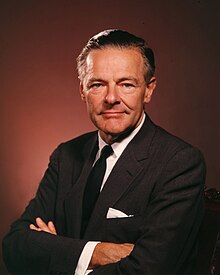
Back هنري كابوت لودج الابن Arabic هنرى كابوت لودج الابن ARZ هنری کابوت لاج، جونیور AZB হেনরি কেবট লজ, জুনিয়র Bengali/Bangla Henry Cabot Lodge junior German Χένρυ Κάμποτ Λοτζ Greek Henry Cabot Lodge Jr. Spanish Henry Cabot Lodge, Jr. Basque هنری کابوت لاج، جونیور Persian Henry Cabot Lodge, Jr. French
Henry Cabot Lodge Jr. | |
|---|---|
 Official portrait, 1960 | |
| Personal Representative of the President to the Holy See | |
| In office June 5, 1970 – July 6, 1977 | |
| President | Richard Nixon Gerald Ford Jimmy Carter |
| Preceded by | Harold H. Tittmann Jr. (acting) |
| Succeeded by | David M. Walters |
| United States Ambassador to West Germany | |
| In office May 27, 1968 – January 14, 1969 | |
| President | Lyndon B. Johnson |
| Preceded by | George C. McGhee |
| Succeeded by | Kenneth Rush |
| United States Ambassador to South Vietnam | |
| In office August 25, 1965 – April 25, 1967 | |
| President | Lyndon B. Johnson |
| Preceded by | Maxwell D. Taylor |
| Succeeded by | Ellsworth Bunker |
| In office August 26, 1963 – June 28, 1964 | |
| President | John F. Kennedy Lyndon B. Johnson |
| Preceded by | Frederick Nolting |
| Succeeded by | Maxwell D. Taylor |
| 3rd United States Ambassador to the United Nations | |
| In office January 26, 1953 – September 3, 1960 | |
| President | Dwight D. Eisenhower |
| Preceded by | Warren Austin |
| Succeeded by | Jerry Wadsworth |
| United States Senator from Massachusetts | |
| In office January 3, 1947 – January 3, 1953 | |
| Preceded by | David I. Walsh |
| Succeeded by | John F. Kennedy |
| In office January 3, 1937 – February 3, 1944 | |
| Preceded by | Marcus A. Coolidge |
| Succeeded by | Sinclair Weeks |
| Member of the Massachusetts House of Representatives from the 15th Essex district | |
| In office 1932–1936 | |
| Preceded by | Herbert Wilson Porter |
| Succeeded by | Russell P. Brown |
| Personal details | |
| Born | July 5, 1902 Nahant, Massachusetts, U.S. |
| Died | February 27, 1985 (aged 82) Beverly, Massachusetts, U.S. |
| Political party | Republican |
| Spouse |
Emily Sears (m. 1926) |
| Children | 2, including George |
| Parent(s) | George Cabot Lodge Mathilda Frelinghuysen Davis |
| Relatives | Lodge family |
| Education | Harvard University (BA) |
| Military service | |
| Branch/service | United States Army |
| Rank | Lieutenant colonel |
| Battles/wars | |
Henry Cabot Lodge Jr. (July 5, 1902 – February 27, 1985) was an American diplomat and politician who represented Massachusetts in the United States Senate and served as United States Ambassador to the United Nations in the administration of President Dwight D. Eisenhower. In 1960, he was the Republican nominee for Vice President on a ticket with Richard Nixon, who had served two terms as Eisenhower's vice president. The Republican ticket narrowly lost to Democrats John F. Kennedy and Lyndon B. Johnson; Lodge later served as a diplomat in the administrations of Kennedy, Johnson, Nixon, and Gerald Ford. Lodge was a presidential contender in the 1964 primary campaign.
Born in Nahant, Massachusetts, Lodge was the grandson of Senator Henry Cabot Lodge and the great-grandson of Secretary of State Frederick Theodore Frelinghuysen. After graduating from Harvard University, Lodge won election to the Massachusetts House of Representatives. He defeated Democratic governor James Michael Curley in 1936 to represent Massachusetts in the United States Senate. He resigned from the Senate in 1944 to serve in Italy and France during World War II. Lodge remained in the Army Reserve after the war and eventually rose to the rank of major general. In 1946, Lodge defeated incumbent Democratic Senator David I. Walsh to return to the Senate.
He led the Draft Eisenhower movement before the 1952 election and managed Eisenhower's successful campaign for the Republican presidential nomination at the 1952 Republican National Convention. Eisenhower defeated Democratic nominee Adlai Stevenson II in the general election, but Lodge lost his own re-election campaign to then-Congressman Kennedy. Lodge was named as ambassador to the United Nations in 1953 and became a member of Eisenhower's Cabinet. Vice President Nixon chose Lodge as his running mate in the 1960 presidential election, but the Republican ticket lost the close election.
In 1963, the now-President Kennedy appointed Lodge to the position of Ambassador to South Vietnam, where Lodge supported the 1963 South Vietnamese coup. In 1964, Lodge won by a plurality a number of that year's party presidential primaries and caucuses on the strength of his name, reputation, and respect among many voters, though the nomination went to Barry Goldwater. This effort was encouraged and directed by low-budget but high-impact grassroots campaign by academic and political amateurs. He continued to represent the United States in various countries under Presidents Johnson, Nixon, and Ford. Lodge led the U.S. delegation that signed the Paris Peace Accords with North Vietnam, leading to the end of the Vietnam War. He died in Beverly, Massachusetts, in 1985.